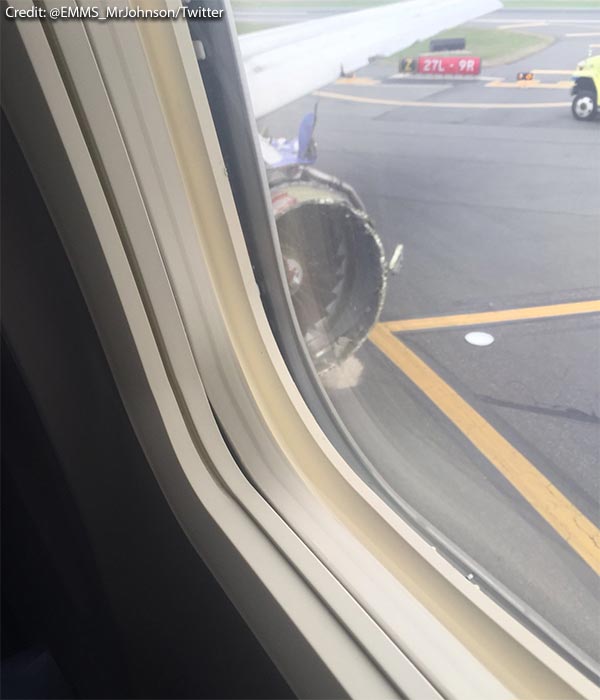Woman killed on Southwest flight from LaGuardia to Dallas, 'metal fatigue' on engine blamed

PHILADELPHIA, Pennsylvania (WABC) -- A preliminary examination of the blown jet engine of the Southwest Airlines plane that set off a terrifying chain of events and left a businesswoman hanging half outside a shattered window showed evidence of "metal fatigue," according to the National Transportation Safety Board.
Jennifer Riordan, a mother of two from New Mexico, was pronounced dead after the New York City-to-Dallas flight made an emergency landing at Philadelphia International Airport with part of an engine cover ripped off and a window damaged late Tuesday morning.
Another 12 people were assessed by medics, officials said, and seven of those people were treated for minor injuries.
Riordan, 43, was a prominent bank executive from Albuquerque. Passengers scrambled to save her from getting sucked out the window that had been smashed by debris, and a registered nurse and emergency medical technician on the flight rushed to try to help her.
The cause of death was blunt impact trauma of the head, neck and torso, the Philadelphia Department of Public Health said.
"There was a lot of chaos back there, a lot of upset people and a lot of noise a big rush of air," Peggy Phillips said. "The window had broken and the suction, the negative pressure, had pulled her out of the plane partially. They managed to get her back inside the plane, and we laid her down and we started CPR."
The Federal Aviation Administration said Southwest Flight 1380 left LaGuardia Airport when the jet apparently blew an engine at about 30,000 feet and got hit by shrapnel that smashed a window and damaged the fuselage.
The emergency landing happened around 11 a.m., as passengers breathing through oxygen masks that dropped from the ceiling prayed and braced for impact.
"I just remember holding my husband's hand, and we just prayed and prayed and prayed," said passenger Amanda Bourman, from New York. "And the thoughts that were going through my head of course were about my daughters, just wanting to see them again and give them a big hug so they wouldn't grow up without parents."
RELATED: One passenger's account of emergency landing
The NTSB spent hours inspecting the damaged engine and the cockpit recordings, and so far, "metal fatigue" on one of the engines is being blamed. But that problem was not apparent during a routine inspection that Southwest says happened on Sunday.
A fan blade broke off at 30,000 feet, and a ring designed to keep those parts from flying out didn't do the job. The engine will be examined further to understand what caused the failure. The investigation is expected to take 12 to 15 months.
"It's very unusual and so we're taking this event extremely seriously," NTSB chairman Robert Sumwalt said. "This should not happen, and we want to find out why it happened."
Sumwalt said at a news conference Wednesday that a crack on the interior of the engine is what led to the failure that shot debris at the plane.
It was the first death stemming from an in-flight accident on a U.S. airliner since 2009, when 49 people on board and one of the ground were killed in the crash of a Continental Express plane near Buffalo.
Former commercial pilot J.P. Tristani said pilots train all the time for engine failure and know how to land if an engine goes out. But it is the uncontained failure that pilots dread most, and it appears that's what happened in this case.
"The problem with any uncontained failure is that you'd be concerned with any of that stuff flying around impacting the control systems," Tristani said. "Either one blade, two, four blades, whatever that engine rotation goes out of balance, and it just disintegrates."
It is likely that transportation safety investigators will re-examine a 2016 engine failure of an exact model Southwest Airline 737. The plane had to make an emergency landing when one of its engines started breaking apart. It landed safely, its damaged engine looking very similar to the failed engine in Tuesday's incident.
Southwest has about 700 planes, all of them 737s, including more than 500 737-700s like the one involved in Tuesday's emergency landing. It is the world's largest operator of the 737. The Boeing 737 is the best-selling jetliner in the world and has a good safety record.
Last year, the FAA required similar planes to undergo ultrasonic testing to find problems that aren't visible to the naked eye. Southwest says that was not required on this specific model, but they are going to start doing it anyway.
----------
























